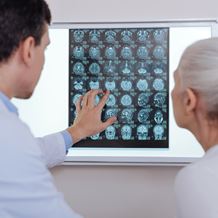Neurology
We help people with disorders of the brain, spinal cord and nerves
St Vincent’s Private Hospitals offer a wide range of neurology related services, for details of the neurology services at your local St Vincent’s Private Hospital, click here.
Our specialist neurologists diagnose and treat headache, epilepsy, movement disorders, stroke and wide range of other problems.
Our neurology departments diagnose and treat people who are experiencing problems that may originate in the brain such as: migraine, cluster headaches, epilepsy, stroke, lack of coordination, muscle weakness, confusion, dizziness and change in sensation. If you’re having trouble with your sense of touch, vision or smell, your GP may refer you to a neurologist.
Some of our neurologists specialise in treating people with movement disorders — such as Parkinson’s disease and dystonia. Others specialise in degenerative diseases affecting the brain, spinal cord, nerves, muscles and senses; such as dementia, multiple sclerosis and motor neurone disease.
Neurologists are also involved when we treat people with infections that affect the brain such as encephalitis, meningitis and brain abscesses.
Our neurologists work with neurosurgeons (brain surgeons) to treat people with brain cancer and brain aneurysms.

Our neurologists
Many of Australia’s neurologists practice at a St Vincent’s Private Hospital.
Our neurologists are amongst Australia’s leading and most respected practitioners, who have all undergone a rigorous process of assessment prior to gaining admitting privileges to our hospitals.
We have neurologists with interests and expertise in all aspects of neurology.
Our neurology procedures
Our tests on nerve and brain function include:
- Nerve conduction studies and electromyography
- Electroencephalograms (EEGs)
- Somatosensory evoked potentials, visual evoked potentials, brainstem auditory evoked potentials and motor evoked potentials
- Diagnostic nerve and muscle ultrasound
- Muscle biopsies
Procedures and manage therapies include:
- Ultrasound-guided nerve and muscle procedures (e.g. nerve blocks)
- Muscle-weakening injections for neurological conditions including dystonia and migraine
- Advanced therapies for Parkinson’s disease
- Deep brain stimulation for dystonia and tremor
Headache
Headache is one of the most common disorders. Headache can be a primary disorder, for example migraine, tension headache and cluster headache. It can also be a secondary disorder e.g. caused by something else wrong with the brain or body.
A neurologist can diagnose and treat primary headaches as well as diagnose the cause of secondary headaches. Different types of headache respond to different treatments. And sometimes headache could be a warning sign of something serious, so if you’re experiencing severe and/or recurring headaches, it’s important to seek a proper diagnosis.


Epilepsy
Diagnosing epilepsy begins with a variety of tests which can include a physical exam, blood tests, an ECG, a CT scan and an MRI.
Treatments for epilepsy vary depending on your symptoms and how the condition is affecting your lifestyle. Medications, medically-supervised diets and implantable devices are options your neurologist may discuss with you. If you’re diagnosed with epilepsy you won’t be left to manage this on your own; There’s also a comprehensive support team available to help you with your condition.
Parkinson’s disease
Because there’s no specific test for Parkinson’s disease, your neurologist normally bases the diagnosis on signs, symptoms and a neurological examination. Other conditions also need to be excluded, which may require some tests and imaging.
Treatments include lifestyle changes, exercise, physiotherapy and medications that can improve your ability to walk and move — as well as reducing tremor. Following a diagnosis of Parkinson’s disease, you can rely on us to help support you with managing your condition.

Find a hospital near you offering neurology
St Vincent’ Private Hospital Melbourne has specialist neurosurgical theatres with state-of-the-art facilities allowing for the most complex of procedures.
St Vincent’s Private Fitzroy has a 34-bed specialised Neuroscience Unit, and 8 beds and a highly qualified specialist medical and nursing staff in our Intensive Care Unit.
St Vincent’s Private Hospital Melbourne collaborates closely with St Vincent Hospital Melbourne to benefit our patients in numerous ways.
We perform brain surgery for:
- craniotomy for cerebral tumour
- cerebral aneurysms
- arteriovenous malformations
- subdural haematoma
- hydrocephalus
- neuralgia
- Parkinson’s disease
- movement disorders
- epilepsy
- depression
- anterior cervical discectomy and fusion
- posterior cervical discectomy
- cervical Foraminotomy
- insertion of artificial cervical disc
- thoracic laminectomy, discectomy, fusion, vertebrectomy, decompression and removal of spinal tumours
- lumbar laminectomy, discectomy, microdiscectomy, fusion
- removal of spinal tumors (anterior or posterior approach)
- Parkinson’s disease
- Multiple Sclerosis
- Gillian Barré Syndrome
- epilepsy
- CIDP
- stroke
- migraine
- hydrocephalus
- trigeminal neuralgia
- CJD
- Myasthenia Gravis
- pituitary management
- vestibular disorders
St Vincent's Private Hospital Melbourne is the first hospital in Victoria to use the Brainlab AIRO surgical navigation system.
AIRO is an intra operative CT scanner. This means that instead of a patient having to travel to and from a traditional CT machine pre, post or during surgery, all scans can be taken in theatre and relayed to the surgeon in real time.
For our patients this means less time under anaesthetic and an increase in the likelihood of successful surgery. For our surgeons, they now have far greater accuracy when visualising the field of surgery and because of this, a positive outcome for their patient is a greater possibility.
Your GP can refer you to one of our neurologists.
Find details of our neurologists here
Contact Us
Working closely with our neurosurgeons, medical and nursing staff, our highly specialised and experienced neurologists provide a clinical and diagnostic service for assessment and management of people with disorders of their brain, spinal cord, nerve and muscle.
Some of the common neurological conditions that we treat include:
- Stroke (cerebrovascular disease)
- Dementia and cognitive disorders
- Epilepsy
- Headache (including migraine)
- Motor neurone disease
- Movement disorders including Parkinson’s disease, dystonia and tremor
- Multiple sclerosis
- Neuroimmunology
- Neuromuscular (peripheral nerve and muscle) disorders
- Neuro-oncology
- Pain diagnosis and management
- Spinal cord and nerve root disorders (compressive, inflammatory etc)
Our neurologists are committed to meeting the unique needs of each patient, with tailored care and treatment plans. With a notable number of firsts, we have pioneered the safest and most advanced technology to treat neurological conditions.
Our neurological services include:
- EEGs
- Nerve conduction studies and electromyography, including single fibre studies
- Somatosensory evoked potentials and motor evoked potentials
- Nerve and muscle ultrasound and ultrasound-guided nerve blocks
- CT scanning/CT spinal angiography
- MRI
- Cerebrospinal fluid analysis
- Muscle weakening injections for neurological conditions including dystonia and migraine
- Deep brain stimulation for Parkinson’s disease, dystonia and tremor
- Muscle histopathology
Contact Us
Our services:
- EEGs
- Nerve conduction studies and electromyography, including single fibre studies
- Somatosensory evoked potentials and motor evoked potentials
- MRI
- Cerebrospinal fluid analysis
- Subspecialty expertise includes:
- Cerebrovascular disease (stroke)
- Dementia and cognitive disorders
- Epilepsy
- Headache (including migraine)
- Motor neurone disease
- Multiple sclerosis
- Neuroimmunology
- Neuromuscular (peripheral nerve and muscle) disorders
- Neuro-oncology
- Pain diagnosis and management
- Spinal cord and nerve root disorders
We have specially trained health professionals in neurology.
Contact Us
Services include:
- EEGs
- Nerve conduction studies and electromyography, including single fibre studies
- Somatosensory-evoked potentials and motor-evoked potentials
- Nerve and muscle ultrasound and ultrasound-guided nerve blocks
- CT scanning/CT spinal angiography
- MRI
- Cerebrospinal fluid analysis
- Muscle weakening injections for neurological conditions including dystonia and migraine
- Deep brain stimulation for Parkinson’s disease, dystonia and tremor
- Muscle histopathology
- Cerebrovascular disease (stroke)
- Dementia and cognitive disorders
- Epilepsy
- Headache (including migraine)
- Motor neurone disease
- Movement disorders including Parkinson’s disease, dystonia and tremor
- Multiple sclerosis
- Neuroimmunology
- Pain diagnosis and management
Your GP can refer you to one of our neurologists. A same-day service is available for direct urgent GP referrals.
Our dedicated team of visiting medical specialists includes some of Australia’s most experienced and innovative health professionals from metropolitan and large regional centres.
We work closely with Griffith Base Hospital to complement the high quality and essential public health services it provides to the community.
Our approach to your care:
- Extensive menu with all meals freshly prepared on site and made to order
- Free wifi
- Our facility offers peaceful gardens spaces for quiet reflection
- Access to pastoral care services and chapel with services held monthly
- Coffee shop onsite offering beverages, light meals and the opportunity to socialise with visitors
View details of our neurology specialists here
Contact Us




